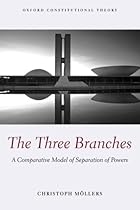Read The Three Branches: A Comparative Model of Separation of Powers (Oxford Constitutional Theory) by Christoph Moellers Online
* The Three Branches: A Comparative Model of Separation of Powers (Oxford Constitutional Theory) Á PDF Download by * Christoph Moellers eBook or Kindle ePUB Online free. The Three Branches: A Comparative Model of Separation of Powers (Oxford Constitutional Theory) "Important contribution to democratic theory" according to A. J. Sutter. This is a dense and stimulating book about constitutional theory, written from a comparative point of view. Discussing not only national contexts but also the EU and general public international law arenas, it’s a rare examination of the meaning and purpose of splitting the powers of government among legislative, executive, and judiciary branches. The author (CM) is a leading German constitutional scholar who spent ti

| Title | : | The Three Branches: A Comparative Model of Separation of Powers (Oxford Constitutional Theory) |
| Author | : | |
| Rating | : | 4.30 (546 Votes) |
| Asin | : | 0198738080 |
| Format Type | : | paperback |
| Number of Pages | : | 280 Pages |
| Publish Date | : | 2017-11-30 |
| Language | : | English |
from the University of Munich and a Master of Law of the University of Chicago Law School. iur. He holds a Dr. . He was a Fellow at NYU School of Law and a Visiting Professor at Central European University Budapest and Universite Paris II, Pantheon-Assas. Christoph Moellers, Professor of Public Law and Jurisprudence and Permanent Fellow, Institute for Advanced Study, BerlinChristoph Mollers, Professor of Law at Humboldt-University and Permanent Fellow at the Instit
It connects an argument from normative political theory with phenomena taken from comparative constitutional law. They also enable us to establish a normative framework that throws a fresh perspective on problems of constitutional law in different constitutional systems: constitutional judicial review of legislation, limits of legislative delegation, parliamentary control of the executive, and standing. This book develops a new, comprehensive, and systematic account of the principle. It then applies this new concept to legal problems of different national constitutional orders, the law of the European Union, and international institutional law. The book argues that the conflict between individual liberty and democratic self-determination that is characteristic of modern constitutionalism is proceduralized through the establishment of different governmental branches. These criteria define a common ground in the confusing variety of western constitutional trad
"Important contribution to democratic theory" according to A. J. Sutter. This is a dense and stimulating book about constitutional theory, written from a comparative point of view. Discussing not only national contexts but also the EU and general public international law arenas, it’s a rare examination of the meaning and purpose of splitting the powers of government among legislative, executive, and judiciary branches. The author (CM) is a leading German constitutional scholar who spent time studying an
About the AuthorChristoph Moellers, Professor of Public Law and Jurisprudence and Permanent Fellow, Institute for Advanced Study, BerlinChristoph Mollers, Professor of Law at Humboldt-University and Permanent Fellow at the Institute for Advanced Study in Berlin, studied Law, Philosophy, and Comparative Literature at the Universities of Tubingen, Madrid, and Munich. He was a Fellow at NYU School of Law and a Visiting Professor at Central European University Budapest and Universite Paris II, Pantheon-Assas. . He holds a Dr. iur. from the University of Munich and a Master of Law of the University of Chicago Law School
Download The Three Branches: A Comparative Model of Separation of Powers (Oxford Constitutional Theory)
Download as PDF : Click Here
Download as DOC : Click Here
Download as RTF : Click Here
